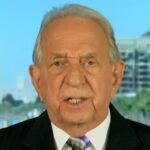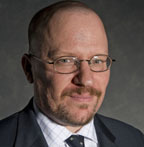The following statements about Monday night’s final presidential debate from policy experts at The Heartland Institute – a free-market think tank – may be used for attribution. The topics discussed include federal spending, taxes, monetary policy, education, energy, and the environment.
For more comments, refer to the contact information below. To book a Heartland guest on your program, please contact Tammy Nash at [email protected] and 312/377-4000. After regular business hours, contact Jim Lakely at [email protected] and 312/731-9364.
“While both Romney and Obama are articulate, bright men, Obama has lost ground during the debating season because Romney has one commanding advantage: the facts are mostly on his side. His harping on 23 million underemployed, a rising number of people on food stamps, the small number of new business formations, etc. has appropriately adversely impacted his opponent and has enhanced the possibility of a Romney victory.”
Richard Vedder
Professor of Economics
Ohio University
Policy Advisor, Economics
The Heartland Institute
[email protected]
312/377-4000
“Obama keeps talking about the same old policies that got us into the mess we are in. He seems to have no idea what those really are. The real causes of the financial crisis were the overregulation of Clinton’s National Home Ownership Strategy, which gave birth to the subprime mortgage market, and the cheerleading of the Bush Treasury Secretaries for cheap-dollar, low-interest monetary policies, exactly contrary to Reagan, which also contributed mightily to the housing bubble. There is no economic theory under which tax-rate cuts are recessionary, even Keynesian economics, or Marxism.”
Peter Ferrara
Senior Fellow, Entitlement and Budget Policy
The Heartland Institute
[email protected]
312/377-4000
Mr. Ferrara is the author of America’s Ticking Bankruptcy Bomb (2011)
“Romney was correct to argue that a peaceful world requires more than killing the bad guys. Free markets and governments accountable to their people through elections best promote peace. My study of the interplay of economic development, economic freedom, and political freedom indicates that political freedom has a strong basis in culture, and there may not be an easy way to transform the world from war and instability to peace and prosperity.
“But, my study also shows that all the major cultures of the world embrace the broad themes of a market-oriented, private property-based economy, limited government, and the rule of law. I realize that, after many years of war, we have, it seems, lost the hopes we had entering this century, for a flowering of peace and prosperity in the world. But, we have actually made a lot of progress, although terribly and even in some cases tragically uneven.”
Clifford Thies
Professor of Economics and Finance
Shenandoah University
[email protected]
312/377-4000
“That education policy was mentioned more in this last debate than any other is astonishing and underscores both candidates’ unwillingness to talk about foreign policy. While both candidates and the moderator were eager to outdo each other in expressing love to teachers, voters should be more concerned about how their proposed policies will impact schoolchildren.
“The simple truth is that the United States does not need more or even to maintain current levels of education spending, which both candidates have said and implied. Romney, in particular, needs to see the graphs showing U.S. education spending tripling over the past 50 years while student achievement has stagnated. Research shows spending is not correlated with student performance. This may be why his Democrat-controlled Massachusetts legislature sent him education cuts.”
Joy Pullmann
Research Fellow, The Heartland Institute
Managing Editor, School Reform News
[email protected]
312/377-4000
“Although the third debate was supposed to be about foreign policy, the candidates took the opportunity to discuss their ideas on education, which has been a neglected topic during these debates. What a disappointment. President Obama touted his record on reform, claiming that his administration’s efforts have resulted in ‘progress and gains in schools that were having a terrible time.’
“The fact is, student scores on the National Assessment of Educational Progress in reading and math haven’t budged since Obama took office, despite pouring nearly $308 billion into K-12 education since he took office, including $100 billion of the $787 billion federal stimulus in 2009, and $10 billion for the ‘EduJobs’ bill in 2010.
“At the same time, Gov. Romney danced around directly criticizing the president’s plans to hire 100,000 new teachers. Romney said the federal government shouldn’t be in the business of hiring teachers, and that’s true. He might have pointed out that the United States doesn’t need more teachers, but we could most certainly use better teachers.
“Someday, maybe soon, a presidential candidate needs to level with Americans that spending hundreds of millions of additional federal tax dollars into education with virtually no improvement is a waste of money. Our public education system is badly broken. Neither President Obama nor Gov. Romney have made much of a case for fundamental reform.”
Ben Boychuk
Policy Advisor, Education
The Heartland Institute
[email protected]
312/377-4000
“There was no mention of ‘global warming’ in any of the three presidential debates this year. This is the first time since 1984 that the topic has not been brought up by one of the moderators or one of the candidates. This is not good news to Al Gore or the thousands of scientists who depend on the global warming scare to trigger the federal research grants that keep them richly employed while so many Americans can’t find a job of any kind. The reality that there is no significant man-made global warming seems to be more and more accepted by voters and politicians.”
John Coleman
Meteorologist, KUSI-TV San Diego
[email protected]
312/377-4000
“It is very surprising to see three presidential debates and one vice presidential debate pass without a single mention of climate change. This is the first time this has happened since global warming hit the national stage in 1988. Global warming activists are justifiably outraged by this. After all, Obama declared in April of this year to Rolling Stone that he would make global warming a key campaign issue in 2012.
“What happened? How did climate change get reduced to a comedic punch line in the 2012 presidential campaign? The answer is clear. The man-made global warming fear movement never overcame having a partisan figure like Al Gore being its public face and suffered from having the scandal-ridden and distrusted UN IPCC as the source of its science.
“Adding to these woes is the fact that the Climategate scandal had massive consequences on public opinion and there was a collapse of the U.N. climate treaty talks. In addition, the continued disintegration of the warmists’ climate claims by real-world data and in the peer-reviewed literature make attempting to scare the public into climate ‘action’ virtually impossible.
“Perhaps the most important factor in the climate silence in the 2012 presidential race was a result of the forced vote in the House of Representatives to pass a cap-and-trade bill in 2009 which helped fuel the rise of the Tea Party movement in the U.S. No longer could a politician regurgitate the standard global warming claims of consensus and the need to ‘act’ without facing laughter and derision from angry crowds.
“It is finally time to say RIP man-made global warming fears in U.S. politics.”
Marc Morano
Publisher
Climate Depot
[email protected]
312/377-4000
“After the third debate, Romney is clearly ahead in the race for the White House. The question now is: Can he carry enough Senate hopefuls along to victory and gain a majority? He will need the Congress to effectively undo all the damage of the past four years.
“Mitt Romney and Paul Ryan understand that the key to rapid economic recovery is a sound energy policy – based on a realistic non-ideological appraisal of environmental issues – including climate. For this, President Romney will need a strong and courageous head of the Environmental Protection Agency and Interior Secretary not afraid to tackle the bureaucracy.
“The Romney-Ryan road map should be fairly clear; we will know we are on the right track when (1) oil imports fade away and when gas at the pump dips below $2, and (2) when domestic energy and electricity prices fall and low-income households can afford to keep warm in cold winters and cool and comfortable in hot summers.”
S. Fred Singer, Ph.D.
Senior Fellow, Environment
The Heartland Institute
Director/Founder
Science and Environmental Policy Project
[email protected]
312/377-4000
“As new overseas oil and gas basins such as offshore East Africa become an increasingly important part of the world’s supply equation, a strong U.S. Navy is absolutely paramount to protecting our country’s energy assets abroad. To claim that somehow the size of our modern Navy is an anachronism akin to the reduced importance of ‘the number of horses and bayonets’ demonstrated the president’s ignorance of this key concept.”
Paul Crovo
Energy Analyst, Policy Advisor
The Heartland Institute
[email protected]
215/499-9117
“Because energy security is such a vital component of U.S. foreign policy, it was disappointing that it received little more than a brief mention. Early in the debate, President Obama, once again, lauded his policies for decreasing America’s oil imports. This is hardly something to brag about. Gasoline consumption is down due to the overall bad economy – fewer people driving to work; and the high prices – fewer people driving for pleasure travel, like a vacation. He also tried to take credit for the increased oil and gas production at home. It’s been frequently proven that production is up, not because of his policies, but in spite of them.
“Obama reaffirmed his commitment to ‘clean energy,’ claiming that such ‘technologies will allow us to cut our imports in half by 2020.’ Fact checkers are not likely to extend their efforts there, so allow me. The president has sunk billions and billions of taxpayer dollars into failing enterprises – Solyndra and A123 Systems are just the first and the most recent domino to fall. The majority of these “clean energy” companies produce electricity – and we do not import electricity. Generating more electricity from wind and solar will not ‘cut our imports in half.’
“The only way to ‘cut our imports in half’ is to open up federal lands to exploration and extraction, and expedite permitting to encourage domestic drilling. During last night’s debate, Gov. Romney reiterated his commitment to ‘taking full advantage’ of our domestic resources.
“In his closing statement, Gov. Romney said: ‘The president’s path will mean a continuing decline in take-home pay.’ While he didn’t specifically address energy here, it is a factor. As energy costs continue to rise – both electricity and transportation fuels – under President Obama’s policies, everyone’s disposable income goes down with the poor being hit the hardest. The middle class can’t stimulate the economy by buying a new dress, computer, or car, and the poor have to make harsh decisions between heating and eating. The disadvantaged become even more disadvantaged.”
Marita Noon
Executive Director
Citizens Alliance for Responsible Energy
[email protected]
505/239-8998
“It is quite appropriate that domestic issues were brought up as they are pertinent to foreign policy. Our standing in the world and our military strength depend on our economic strength. It is disappointing that neither candidate mentioned that our ability to win World War II came from our enormous industrial capacity. This capacity has been hollowed out by tax and regulatory policy that has driven some 40,000 factories offshore.
“It will be impossible to rebuild without affordable abundant energy from currently available sources that work (coal, oil, natural gas, and nuclear). We can’t afford to fuel our Navy, Air Force, or Army on biodiesel. Many nations now have weapons of mass destruction, and we have deployed one such weapon – debt – against ourselves.”
Jane M. Orient, M.D.
Executive Director
Association of American Physicians and Surgeons
[email protected]
312/377-4000
“While yesterday’s debate was focused primarily on foreign policy, the brief discussion about the auto industry bailout was informative. President Obama doesn’t seem to understand the difference between bankruptcy and liquidation. Perhaps that’s not too surprising given the fact that he has no experience in the private sector.
“The truth is that bankruptcy is a protective measure that allows a company to negotiate a reorganization with its creditors and emerge from bankruptcy in a sustainable financial position. In the long term, the auto industry, and the U.S. taxpayers, would have been better served by following a normal course, private-sector bankruptcy, just as many large companies have done, without government intervention.”
Jonathan Steitz
Policy Advisor, Budgets and Taxes
The Heartland Institute
[email protected]
262/308-8885
The Heartland Institute is a 28-year-old national nonprofit organization headquartered in Chicago, Illinois. Its mission is to discover, develop, and promote free-market solutions to social and economic problems. For more information, visit our Web site or call 312/377-4000.












